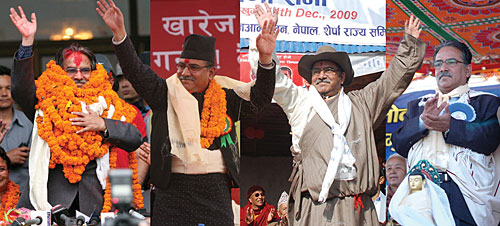 KIRAN PANDAY/GANESH PANDAY MAN FOR ALL 'TREASONS': Maoist Chairman Pushpa Kamal Dahal has shown us how versatile he is, but what has he really done for the common people? |
Key ministers in the cabinet are in Copenhagen, the Maoist opposition is gearing up for a total national shutdown from next week, and efforts to find a way to bring the Maoists back into government have failed so far. The Maoists themselves are spending their time flying around the country declaring ethnic autonomous councils and have threatened a 'parallel government'.
In all these fun and games, none of the national players have given any thought to a looming economic emergency. The banking sector is facing a liquidity crisis the likes of which this country hasn't seen, remittance growth is down, the trade deficit with India is growing, domestic production is down and consumer spending is up. Everything is pointing to an economic crisis stemming from prolonged political uncertainty and instability.
Nepal's trade deficit with India is now a whopping Rs100 billion and growing every quarter. While the balance of payments was still healthy, Nepal paid for goods imported from India in remittance and tourism dollars. But money transfers from Nepalis working abroad have plateaued. Overall exports are down, and the fuel import bill is up by 90 per cent from last year. There has been a three-fold increase in vehicle imports this year, which will mean another spike in fuel imports in 2010. All this will put further pressure on rupee parity with India.
"The economy is a soap bubble, it can go any moment," said one senior government adviser who is worried that the ministers have no time to think about medium and long-term interventions to rescue the economy.
Banks are heavily exposed with unproductive consumer lending and real estate with long-term gestation, exacerbating the cash crunch. Interest rates have recently climbed up to 16 per cent, dampening business.
On 1 January, Nepal will have to open up its services sector including banking to foreign investors under WTO rules. This will mean that smaller banks and finance companies will find it even harder to survive.
READ ALSO:
Crises loom near - From The Brief
Including the excluded - FROM ISSUE #481 (18 DEC 2009 - 24 DEC 2009)
The golden middle - FROM ISSUE #481 (18 DEC 2009 - 24 DEC 2009)


